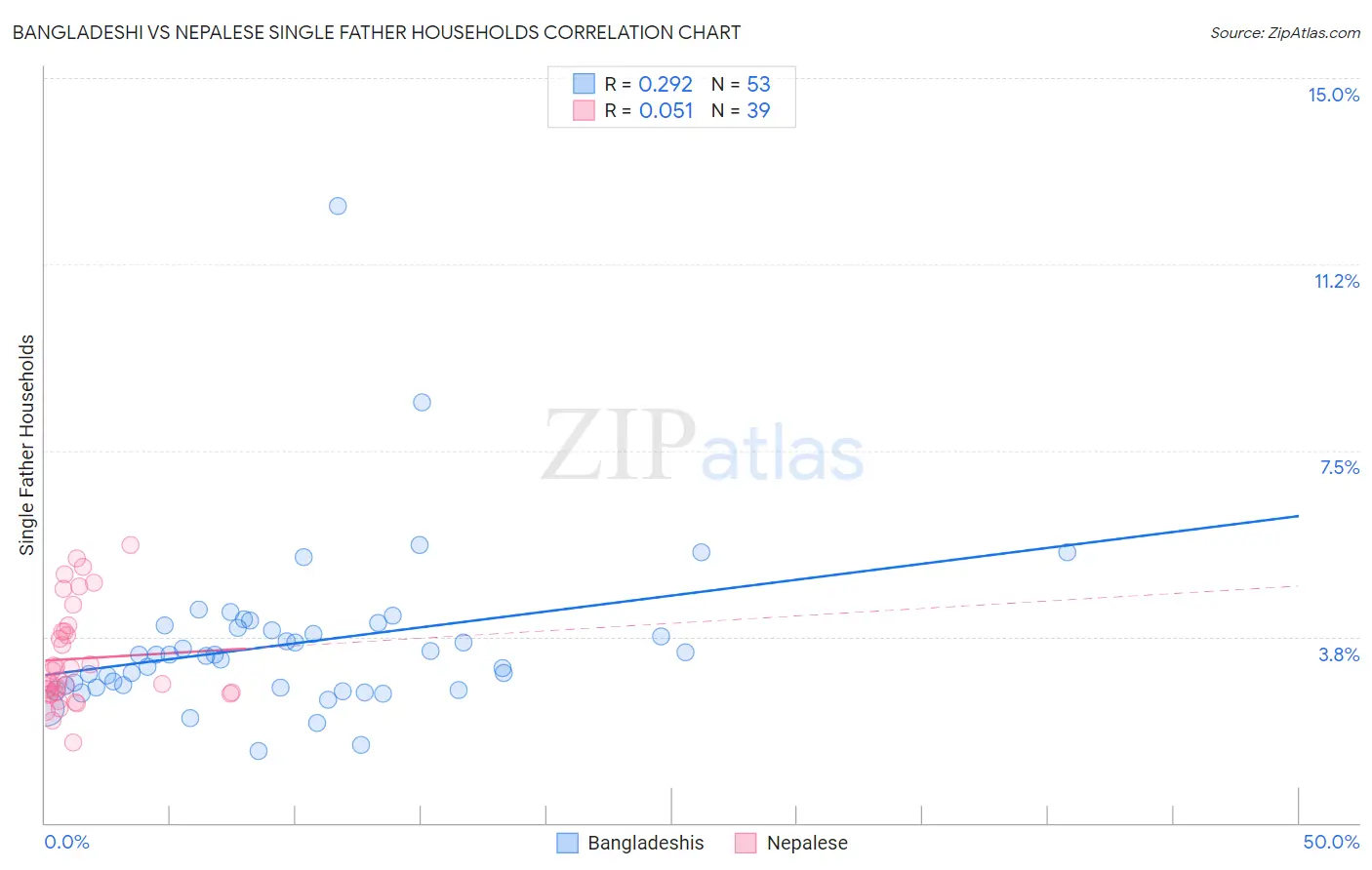Bangladeshi vs Nepalese Single Father Households
COMPARE
Bangladeshi
Nepalese
Single Father Households
Single Father Households Comparison
Bangladeshis
Nepalese
3.1%
SINGLE FATHER HOUSEHOLDS
0.0/ 100
METRIC RATING
327th/ 347
METRIC RANK
3.1%
SINGLE FATHER HOUSEHOLDS
0.0/ 100
METRIC RATING
330th/ 347
METRIC RANK
Bangladeshi vs Nepalese Single Father Households Correlation Chart
The statistical analysis conducted on geographies consisting of 140,991,030 people shows a weak positive correlation between the proportion of Bangladeshis and percentage of single father households in the United States with a correlation coefficient (R) of 0.292 and weighted average of 3.1%. Similarly, the statistical analysis conducted on geographies consisting of 24,491,034 people shows a slight positive correlation between the proportion of Nepalese and percentage of single father households in the United States with a correlation coefficient (R) of 0.051 and weighted average of 3.1%, a difference of 1.5%.

Single Father Households Correlation Summary
| Measurement | Bangladeshi | Nepalese |
| Minimum | 1.4% | 1.6% |
| Maximum | 12.4% | 5.6% |
| Range | 11.0% | 4.0% |
| Mean | 3.6% | 3.3% |
| Median | 3.4% | 2.9% |
| Interquartile 25% (IQ1) | 2.7% | 2.6% |
| Interquartile 75% (IQ3) | 3.9% | 3.9% |
| Interquartile Range (IQR) | 1.2% | 1.3% |
| Standard Deviation (Sample) | 1.7% | 1.0% |
| Standard Deviation (Population) | 1.7% | 0.99% |
Demographics Similar to Bangladeshis and Nepalese by Single Father Households
In terms of single father households, the demographic groups most similar to Bangladeshis are Immigrants from Cabo Verde (3.1%, a difference of 0.55%), Chippewa (3.1%, a difference of 0.65%), Aleut (3.0%, a difference of 0.88%), Immigrants from Mexico (3.0%, a difference of 1.1%), and Fijian (3.0%, a difference of 2.3%). Similarly, the demographic groups most similar to Nepalese are Chippewa (3.1%, a difference of 0.88%), Immigrants from Cabo Verde (3.1%, a difference of 0.98%), Navajo (3.2%, a difference of 2.3%), Yaqui (3.2%, a difference of 2.3%), and Aleut (3.0%, a difference of 2.4%).
| Demographics | Rating | Rank | Single Father Households |
| Cape Verdeans | 0.0 /100 | #318 | Tragic 2.9% |
| Ute | 0.0 /100 | #319 | Tragic 3.0% |
| Guatemalans | 0.0 /100 | #320 | Tragic 3.0% |
| Mexicans | 0.0 /100 | #321 | Tragic 3.0% |
| Immigrants | Guatemala | 0.0 /100 | #322 | Tragic 3.0% |
| Immigrants | Central America | 0.0 /100 | #323 | Tragic 3.0% |
| Fijians | 0.0 /100 | #324 | Tragic 3.0% |
| Immigrants | Mexico | 0.0 /100 | #325 | Tragic 3.0% |
| Aleuts | 0.0 /100 | #326 | Tragic 3.0% |
| Bangladeshis | 0.0 /100 | #327 | Tragic 3.1% |
| Immigrants | Cabo Verde | 0.0 /100 | #328 | Tragic 3.1% |
| Chippewa | 0.0 /100 | #329 | Tragic 3.1% |
| Nepalese | 0.0 /100 | #330 | Tragic 3.1% |
| Navajo | 0.0 /100 | #331 | Tragic 3.2% |
| Yaqui | 0.0 /100 | #332 | Tragic 3.2% |
| Natives/Alaskans | 0.0 /100 | #333 | Tragic 3.2% |
| Yuman | 0.0 /100 | #334 | Tragic 3.3% |
| Colville | 0.0 /100 | #335 | Tragic 3.3% |
| Paiute | 0.0 /100 | #336 | Tragic 3.3% |
| Pueblo | 0.0 /100 | #337 | Tragic 3.3% |
| Sioux | 0.0 /100 | #338 | Tragic 3.3% |